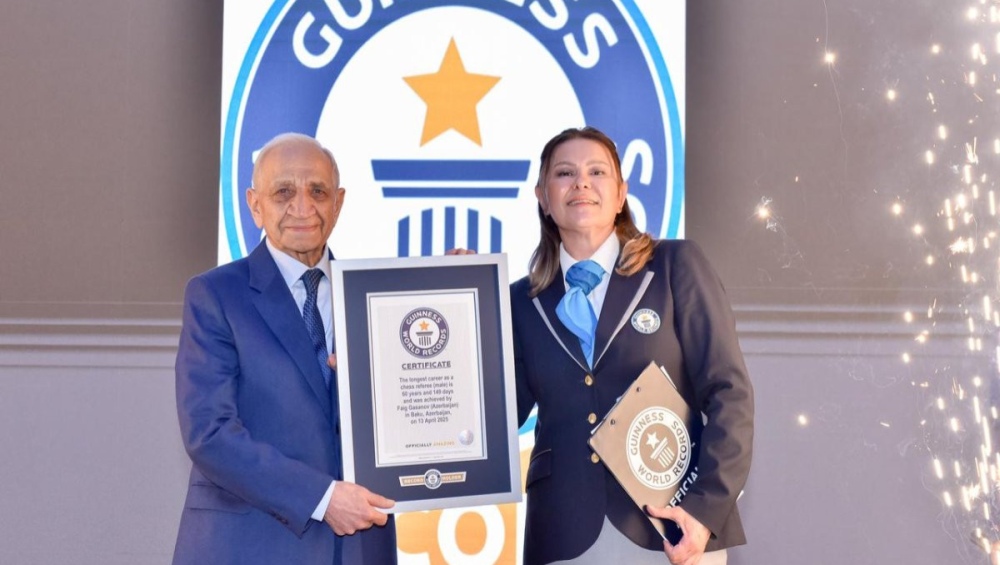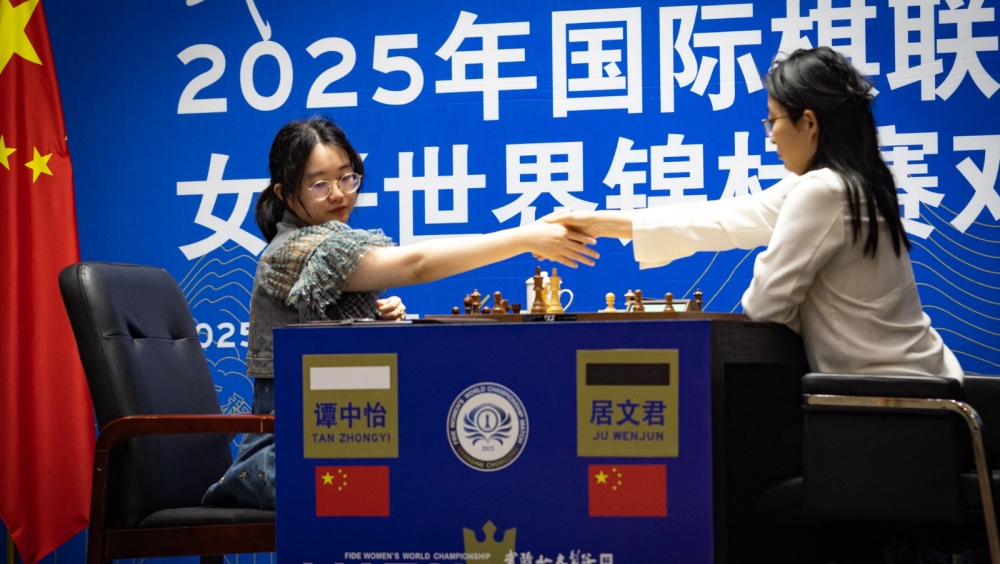FIDE WGP India: Four wins and a wedding

The first round of the Pune Women’s Grand Prix was one of the most exciting afternoons of chess I have ever witnessed, with four of the five games ending in a decisive result. As if this alone weren’t enough to make the entire chess community stop in its tracks and follow the games, a wedding in the gardens of the hotel added a spicy touch to the event. Indian weddings are vibrant celebrations, often spanning several days and featuring a variety of rituals and ceremonies rooted in tradition and cultural significance. These typically include pre-wedding events, the main ceremony, and post-wedding festivities—dances, music, and a lot of food—which, unfortunately, collided with the end of the round. At one point, due to the loud music, Chief Arbiter Ivan Syrovy, ably assisted by Deputy Arbiter Deepti Shidore, decided to suspend the games for about ten minutes. All the players took it well, although some certainly struggled to stay focused. The ceremonial first moves were performed in the game between Munguntuul Batkhuyag and Salome Melia. Aditya Deshpande, Director of City Corporation—the company that manages the Amanora The Fern complex—opened the game for White, while Dr. Parineeta Fuke, Chairperson of the Organising Committee, responded for Black. Let’s take a closer look at the five games. Zhu Jiner 1-0 Harika Dronavalli In the past, most of the games between these two players had ended in draws. Harika tried to surprise her opponent in a very rare side-line of the French defence, and lead her into an unknown position. But Zhu Jiner was up to the challenge. “I wasn’t sure in the opening but she played very solid. She made some mistakes in the middlegame and gave me some chances to win,” said the Chinese GM after the game. Indeed, it was a very tricky situation but most likely 26…gxh5 instead of the correct 26…Qd7 was the decisive mistake, allowing Zhu Jiner to crash through. “Harika is a very solid player. We have played many times and it’s always a draw, so I am happy to have won the first game,” Zhu Jiner concluded in her post-game interview. Alina Kashlinskaya 0-1 Polina Shuvalova After a hiatus from the WGP cycle, Polina Shuvalova returned with a great first round result, defeating Alina Kashlinskaya and notching up her first win towards what might be her second GM norm. “I had to cancel some other tournaments to come here (Shuvalova replaces Kateryna Lagno in Pune) but it’s a great opportunity to play a strong tournament with good prizes,” were her first words after the game. Although the middlegame proved very tense, Shuvalova kept her calm and finished off her opponent with a simple but effective sacrifice to promote her passed c-pawn. “I was definitely having some trouble out of the opening, but my opponent missed her chance to consolidate an advantage. Approaching time trouble, she made a decisive mistake that gave me excellent chances to win the game,” explained Shuvalova in her post-game interview. Vaishali Rameshbabu ½-½ Humpy Koneru Due to fair play reasons, players from the same federation are paired in the first rounds to avoid misunderstandings at the end of the tournament. The all-Indian bout between Vaishali and Koneru was a hard-fought battle in a slow Italian game, in which the recently-crowned World Rapid Champion had to grind down a draw in 53 moves from a queenless middlegame into a very slightly worse endgame. The 99% accuracy displayed by both players clearly indicate their fantastic state of form, with no errors or inaccuracies in this game. We can certainly expect the same amount of fighting spirit for the rest of the event. Nurgyul Salimova 0-1 Divya Deshmukh. Living in Nagpur, a small city in the northeast of the State of Maharashtra, the Indian star was full of joy for playing so near to her home. “I have actually never been to Pune. I feel great playing here and it’s definitely a huge motivation for me. It has been a while since I played in India and I was so happy for only having to take one flight instead of two or three,” Divya explained enthusiastically after the game. Salimova went for a modern computer variation of the London system, with a quick h4 and Rh3, that looked a quite aggressive setup at first glance. However, at a certain point it didn’t seem that her pieces were fully coordinated. “It was a tough game, but I think I could have finished it a lot smoother. I decided to go all-out and this time it worked,” said Divya. Certainly, it was a game of interesting tactics and imbalances, combined with quite a few mistakes and blunders, eventually falling on the side of the Indian prodigy. With regard to the small annoyance of the wedding, Divya understood that these things happen. “It’s my mistake that I lost focus – the wedding music was surprisingly very loud – but it was tough for everyone.” Munguntuul Batkhuyag 1-0 Salome Melia The final game to finish ended in a dramatic way. Playing with Black, Georgian IM Salome Melia went for the fashionable Kalashnikov Sicilian and equalized comfortably out of the opening. She started to pile up the pressure and even achieved a decisive advantage, according to the computer, around move thirty. However, under severe time trouble, she miscalculated a sequence of exchanges, and ended up a pawn down in a very drawable ending. And then the following happened! Moment of the Day I was actually watching the game very closely at this moment and noticed that 78…Nc6! would pick up the a5 pawn and, even a piece down, the ending would be an easy draw as long as White isn’t able to trap the knight somehow. But down to her last thirty seconds, Salome calculated the line quickly, wasn’t totally sure and instead played the natural 78…Kxg7? restoring material balance. However, after the very precise 79.Bb7! the knight was out of moves and a further attack with 80.Kc3 forced the knight to
Faig Gasanov enters the Guinness Book of Records as the longest-serving chess arbiter

On April 14, 2025, Faig Gasanov—who had turned 85 just a day earlier—entered the Guinness Book of Records as the longest-serving chess arbiter in the history of the sport, with a remarkable career spanning 60 years and 149 days. A representative from Guinness World Records, Sheida Subashi, confirmed that all information had been thoroughly reviewed and met the necessary criteria for the record. Born on April 13, 1940, in Tbilisi, Faig Gasanov has dedicated a large part of his life to chess, making significant contributions to the development of the game both in Azerbaijan and around the world. For many years, Gasanov has shared his vast experience in promoting chess in Azerbaijan, shaping new generations of players, and organizing international tournaments. Since 2007, he has served as the Vice President of the Azerbaijan Chess Federation. Gasanov enjoys an impeccable reputation in the chess world. As chief arbiter, he officiated over 150 chess competitions, including prestigious super tournaments in Wijk aan Zee, Linares, the Vugar Hashimov Memorial, the Chess Olympiad, the FIDE World Cup, and the FIDE Grand Prix. His long-running television program Chess Club, which he both authored and hosted on Azerbaijan’s first television channel, AzTV, is celebrating its 56th year on air—setting a national broadcasting record. In 2010, on the occasion of his 70th birthday, Faig Gasanov was awarded a special Gold Diploma of Achievement in recognition of his outstanding service to the International Chess Federation (FIDE) and the global chess community. In 2016, he received the Honorary Award for his contributions to FIDE as an International Arbiter. In addition to his international recognition, Gasanov has been honored by the Azerbaijani government with the “Glory” and “Honor” Orders, as well as the President of Azerbaijan’s Honorary Diploma, for his contributions to the development of chess in the country. In September 2024, Gasanov was awarded the honorary FIDE 100 Medal for his lifelong dedication to the game and his exceptional service to the chess world. Photos: Michal Walusza and vesti.az/
European Senior Team Championship 2025: England claims triple gold

The European Senior Team Chess Championship 2025 concluded yesterday in Świdnica, Poland. The event was held in two age categories—50+ and 65+—and Team England repeated its success from last year by defending three titles! In the 65+ category, nine teams competed, with England 1 scoring a perfect 16 match points to clinch the gold medal. The team dominated the competition, winning all its matches with a minimum score of 3–1. Poland’s Lower Silesia Team earned the silver with 12 match points. Germany’s Saxony Team claimed bronze with 11 match points. The 50+ section featured eight teams, who first played seven rounds, followed by a final-four mini-tournament comprising two additional rounds. England 1 emerged as the champion with 17 match points, securing victories in eight matches and drawing the final round against Germany. Germany took silver with 13 match points. England 2 claimed bronze scoring 12 match points. Meanwhile, England’s Women’s 50+ Team clinched the title of the European Women’s Senior 50+ Team Champions 2025 finishing as the best-ranked women’s team in the competition. Board prizes were awarded to the top individual performers based on their rating performances in both sections. Board 1 (50+ section): 1.GM Michael Adams (England 1); 2.GM Klaus Bischoff (Germany); 3.Marek Zych (Poland Swidnica) Board 2 (50+ section): 1.GM John Emms (England 1); 2.GM Frank Holzke (Germany); 3.FM Neil Dickenson (England 2) Board 3 (50+ section): 1.GM Glenn Flear (England 1); 2.GM Uwe Boensch (Germany); 3.FM Chris Duncan (England 2) Board 4 (50+ section): 1.GM Raj Tischbierek (Germany); 2.GM Nigel Davies (England 1); 3.Philip Crocker (England 2) Board 5 (50+ section): 1.FM Stephen Dishman (England 1); 2.CM Anthony Hughes (Wales Silures); 3.Robert Noyce (England 2) Board 1 (65+ section): 1.GM John Nunn (England 1); 2.FM Wieslaw Janocha (Poland Lower Silesia Team); 3.Wilfried Dr. Beilfuss (Germany SV Osnabruck) Board 2 (65+ section): 1.GM Anthony Kosten (England 1); 2.FM Johan Goormachtigh (Belgium KBSB); 3.FM Janusz Zyla (Poland Lower Silesia Team) Board 3 (65+ section): 1.GM Jonathan Mestel (England 1); 2.FM Guenther Jahnel (German Saxony Team); 3.Marc Stuer (Belgium KBSB) Board 4 (65+ section): 1.IM Peter Large (England 1); 2.Gennadii Topchii (German Saxony Team); 3.Marcel Van Herck (Belgium KBSB) Board 5 (65+ section): 1.FM Robert Vogel (German SK Zaehringen Reloaded); 2.IM Chris Baker (England 1); Norbert Becker (German SV Osnabruck) Final rankings can be found here. Written by European Chess Union Photos: Kamil Galuszka Official website: estcc2025.pl/
Ju Wenjun moves within reach of the title with fourth consecutive win

In Game 8 of the FIDE Women’s World Championship Match, Tan Zhongyi changed her strategy, deviating from her usual English Opening in an attempt to shake things up and force a result. But despite the challenger’s fighting intentions, World Champion Ju Wenjun once again demonstrated why she now stands just half a point away from securing a fourth consecutive title. For the first time in the match, we saw a departure from the opening script. Tan had been consistently starting with 1.c4, but today she chose to break not only from that pattern but also from her standard repertoire. She played 1.e4—famously described by Bobby Fischer as “the best by test”—a logical choice for Tan Zhongyi, who needed more than a slight opening advantage. She needed to win. The first ceremonial moves in Game 8 were made by Chen Shenglin, Vice Chairman of the Chinese People’s Political Consultative Conference (CPPCC) and Deputy Chair of the FIDE Management Board, Dana Reizniece. Let’s once again assess the psychological landscape of the match heading into the game: Ju has just achieved a hat trick, winning three consecutive games and taking a commanding 5–3 lead. With only 6.5 points needed to retain her title, she entered the game with confidence and control. Ju is a champion in her prime—focused, composed, and resolute. She told us in an interview before the match (which you can watch here) that her greatest strength as a world champion is not just hard work, but “concentration.” Watching her during the games—barely leaving her chair and maintaining unwavering focus —it’s clear her actions reflect her words. And this quality has brought her within reach of another successful title defense. Tan, on the other hand, is in a position few would envy: three points behind, under immense pressure, with the world watching. She must fight tooth and nail for every point. Prior to the match, Tan radiated confidence, and we saw glimpses of this in the early games – perhaps too much at times, as she played too quickly in complex positions that required more careful calculation. But that confidence now appears shaken. In recent games, she has hesitated too long in moments that demanded determination. Today, her play reflected a mix of confidence and desperation. She sacrificed a pawn without compensation, and Ju converted the advantage with precise and elegant play. The game began with a Vienna, later transposing into a Bishop’s Opening hybrid – an old system that has been tested recently on the highest level. Even playing with the black pieces, Ju found her rhythm early. White never gained the initiative and in fact, it was Black who took the reins. A puzzling decision by Tan allowed Ju to capture an important central pawn and take control of the game. Here, instead of 25.exf5 with a roughly equal position 25.Qd4? was played and Ju simply captured on e4. The resulting position was clearly better for Black, but what followed was truly impressive. Here, Ju played the brilliant 28…e3!, sacrificing a pawn to open the diagonal for her queen to target the vulnerable c2-pawn. After 29.Qxe3 Qxc2, Tan responded with 30.Qa7 instead of capturing on b5, allowing 30…bxc4 and giving Black a dominant passed pawn. Tan fought back, picking up the c7 and d6 pawns and activating her knight, but the position was already beyond repair. Queens were soon exchanged, and the resulting endgame, Black’s bishop versus White’s knight, with a dangerous passed c-pawn, was completely in Ju’s hands. While she could have chosen a simpler path, the champion trusted her endgame technique and finished the game with confidence. Another beautiful moment when Ju displayed her skill and showed why she is the World Champion, came on move 45: Here Black had to find 45…Bxf3, and once again Ju Wenjun did not disappoint. Black gives up the bishop in exchange for both White’s kingside pawns. 46.Nxf3 Kg4 47.Nd4 Kxg3 and the h-pawn cost White the knight. Tomorrow is a rest day, and the players will return for game 9 on Wednesday. With just half a point needed, Ju can secure the title with a draw. Will this be the final chapter of the match, or will Tan regroup and come back with renewed fire? Game 9 will take place on Wednesday, April 16, at 15:00 local time. Ju Wenjun will have the White pieces. FACT SHEET, Game 8, FIDE Women’s World Championship 2025: White: Tan ZhongyiBlack: Ju WenjunResult: 0-1Opening: ViennaGame length: 53 movesMatch score: 6-2 (in favour of Ju Wenjun) Follow FIDE’s social media channels for updates, tune into YouTube for live commentary and coverage, and visit the official match website for more information. Written by Charlize van Zyl Photos: Anna Shtourman Official website: womenworldchampionship2025.fide.com/ About the Match The 2025 FIDE Women’s World Chess Championship match between Ju Wenjun and Tan Zhongyi follows a 12-game format. The first player to score 6.5 points will be declared the winner. The time control for each game is 90 minutes for the first 40 moves, followed by 30 minutes for the rest of the game, with an increment of 30 seconds per move starting from move 1. If the match is tied at 6-6 after all 12 games, a tiebreak will determine the champion. The tiebreak procedure involves a series of rapid and, if necessary, blitz games to ensure a decisive outcome.

